BBC film sparks media ethics debate in India
- Published
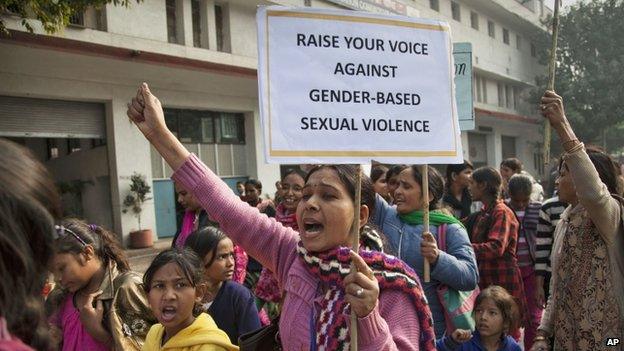
The Delhi bus gang rape started a nationwide debate on women's safety in India
Indian media have reacted strongly to the planned UK broadcast of an interview with one of the Delhi gang rapists on death row, with some denouncing it as "unethical".
Film maker Leslee Udwin's interview with the convict appears in 'India's Daughter', a BBC Storyville documentary due to be broadcast on 8 March, International Women's Day.
It was also due to be shown in India on NDTV. But police in India secured a court injunction late on Tuesday, blocking the broadcast in India.
The Delhi court order also prevents publication of the interview, which has angered many in India.
The Delhi rape shocked the world. Four men were sentenced to hang for raping and murdering a 23-year-old student in 2012. The court injunction against the broadcast of the film in which one of the convicts is showing no remorse and is blaming the victim for fighting back has brought the story back to the fore.
It was the topic of studio discussions across several TV channels on Tuesday night. Times Now, which is known for being direct in its opinions, questioned the BBC and NDTV's decision to run the documentary.
"No right thinking Indian will waste his time in watching the interview... My point is you are saying that we want to reform the society by putting out the interview of a rapist, where he defames the victim. What form of journalism is this. I, too, am a journalist. This is not journalism. This is journalism turned upside down. This is unethical," Times Now editor Arnab Goswami said on his show Newshour, external.
Several papers have also picked up the story, highlighting that the content of the documentary has angered many people in India.
"The government decision came in the wake of the wide-spread protests against the defamatory comments made by the convict in the interview," says The New Indian Express, external.
'Ethical boundary'
But much of the media debate is about the ethics of journalism in India and around the world.
"This is totally unacceptable. We have to draw an ethical boundary. I do not understand why they are doing it [airing the interview]," The Indian Express quotes women's rights activist Ranjana Kumari as saying.
Some activist say the documentary may weaken the case in Indian courts.
"Violation of the judicial process doesn't help the rape victim's case. I also find the ethics of launching a campaign on gender violence in India without holding a conversation with those involved in the Indian women's movement problematic", Kavita Krishnan is quoted as saying in The Times of India, external.
Changing mindsets
Some commentators, however, are backing the documentary, describing it as important research to fight gender crime.
The First Post, external says that most people already knew about the brutality of the convicts and should not be surprised by what one of them said in the interview.
"His statements, brazenly unrepentant, have caused a great furore of outrage on social media. But then he was part of a group of thugs who repeatedly brutalised a young woman... Did we still need additional proof of his bestiality? Or is it somehow more real because it now comes with a BBC certification?
Kiran Bedi, activist-turned politician, who was a chief ministerial candidate in the recently contested Delhi elections, expressed support for such documentaries in a show on NDTV.
"I would like to see every rapist, once convicted, to be interviewed. I would like to endorse this completely...Unless you know the cause of the crime, how will you correct it? How will you prevent it?", she said.
"We must encourage this kind of research and this documentation if we want mindsets to change".
Speaking in parliament, noted film writer and MP Javed Akhtar welcomed the making of the film and said it would reveal how rapists think.
Fellow MP, Anu Aga, supported his view: "The reality is what the man said reflects the views of many men in India. Why we are shying away from it? We are not confronting the issues. Suggesting death penalty is not the answer. We have to confront the issue that many men in India do not respect women. Every time a rape happens, the victim is blamed to have provoked the men. Let's be aware of the view and not pretend all is well."
Twitter debate
The documentary has also been dominating social media discussions in India.
Hashtags #Nirbhayainsulted and #Indiasdaughter have been trending on Twitter.
Most users have expressed anger over the documentary's content and feel Nirbhaya (The Fearless one - a name given to the victim by the media) has been "insulted".

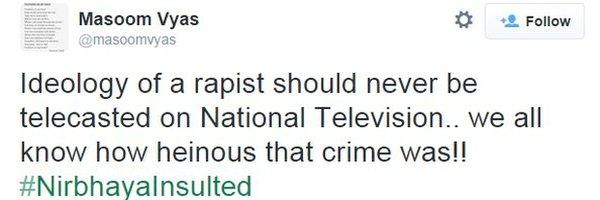

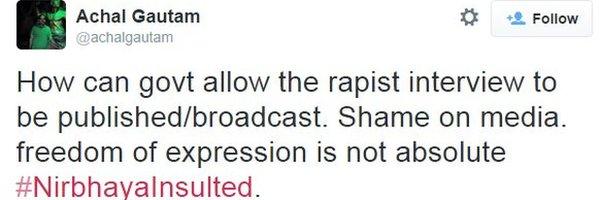

Some users, however, felt it was important to talk about the issue and know what these men actually think about women's rights.

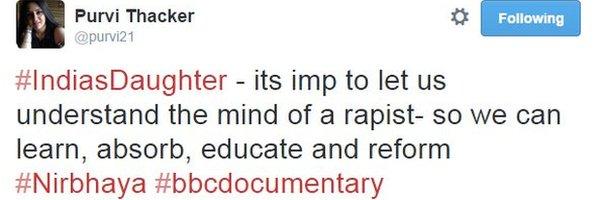

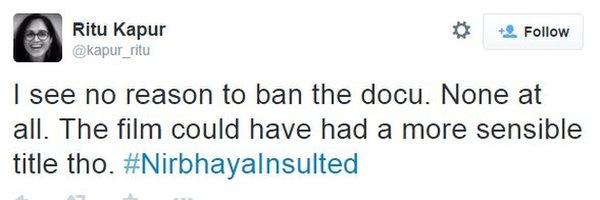

BBC Monitoring, external reports and analyses news from TV, radio, web and print media around the world. You can follow BBC Monitoring on Twitter , externaland Facebook, external.